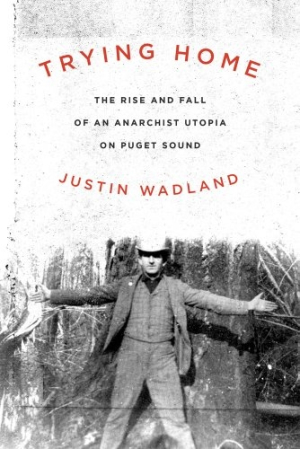Trying Home
The Rise and Fall of an Anarchist Utopia on Puget Sound
Wadland weaves in the record of his own journey to learning about an anarchist colony, elevating this book from journalistic effort to fascinating memoir.
In February 1896, three men set out in a homemade rowboat to find the perfect place along Puget Sound to start an anarchist colony. Part history, part memoir, Justin Wadland’s Trying Home follows both the rise and fall of this community and his own journey to finding out what happened there.
Having been burned by the overregulation and laziness that saturated the socialist community all three had recently been a part of, Oliver Verity, George Allen, and Frank Odell sought a new model on which to build their community. In reaction to their previous experience, they devised a plan where there would be no leaders and no laws, and each individual in the community would be responsible for himself. Two tenets would rule this new community, called Home: the Golden Rule and minding your own business. Despite hostility from the general public following President McKinley’s assassination by an anarchist in 1901, the experiment actually worked … for a while.
Wadland’s writing has appeared in Crab Creek Review and other publications, and this creative background is evident in his nonfiction narrative of Home, Washington. He animates the people and places involved with richly detailed, lyrical prose: “The stone and wooden buildings were densely packed, dark and damp in the wetness; through the haze, an occasional hand-painted sign, a cone spire, a steeple, a chimney with its windward smear of smoke stood in relief against the roofs.”
Trying Home often reads like a novel, detailing not only what life was like in the colony but also how it impacted national events like the McKinley assassination and the bombing of the Los Angeles Times Building in 1910. This book benefits from extensive research gleaned from a variety of sources, from anarchist newspapers that were published in Home to interviews with current residents of the town. Wadland also interweaves the record of his own journey to learn about Home, taking this book beyond the usual small-town archive.
Those interested in the history of utopian communities, anarchism, or the Pacific Northwest will find a fascinating and enlightening read, but the addition of Wadland’s own journey will make this book appealing to a general audience as well. Seeing how the ideas and events that shaped Home also impacted Wadland proves that there is more to learning about history than mere dates and facts.
Reviewed by
Christine Canfield
Disclosure: This article is not an endorsement, but a review. The publisher of this book provided free copies of the book to have their book reviewed by a professional reviewer. No fee was paid by the publisher for this review. Foreword Reviews only recommends books that we love. Foreword Magazine, Inc. is disclosing this in accordance with the Federal Trade Commission’s 16 CFR, Part 255.

